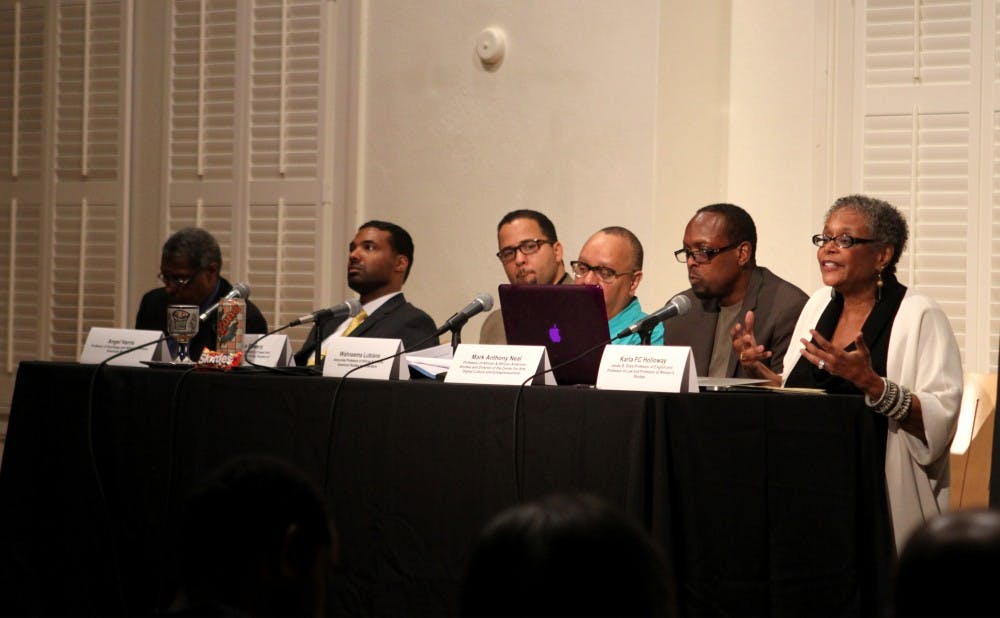Students, faculty and members of the Durham community gathered in a packed East Duke auditorium Monday night for a town hall discussion in light of the recent events in Ferguson, Mo.
The event was hosted by the African and African-American Studies department and featured remarks from several faculty members. The police shooting of Ferguson teenager Michael Brown and the resulting protests were used as a springboard to discuss issues including militarization of American police, lack of transparency and excessive court proceedings.
“Ferguson is a proxy for existence as many know it,” said Wahneema Lubiano, associate professor of African and African-American studies. She noted that these issues are not unique to Ferguson—they are issues that the Durham community and its officials will need to confront.
Many students have already begun confronting these issues through activism on Twitter, Instagram and Facebook, said Mark Anthony Neal, professor of African and African-American studies. He noted that much of the Twitter response to the events in Ferguson has occurred as a response to the mainstream media’s depiction of Michael Brown. The social media activism by black youth, such as the hashtag #IfTheyGunnedMeDown, can be compared to the student activism during the Freedom Summer 50 years ago, he said.
Neal noted the power of social media as an activist tool, but emphasized that online interaction is not enough to sustain an entire movement.
“Twitter is not a replacement for the grassroots organizing that needs to occur,” Neal said.
Luke Powery, dean of the Duke Chapel and associate professor of the practice of homiletics, began his remarks with a hymn as a tribute to Michael Brown. He noted that the issue of racial profiling is deeply rooted in America, calling it a "historical continuity of corporeal terrorism."
Professors provided differing perspectives on how the nation might move forward.
Sociology professor Angel Harris emphasized that activist attempts to bring about a change in policing will require “a real and open dialogue about race.” He addressed the issue of "blind spots," individual biases that prevent people from having the kinds of conversations about race he calls for.
Lubiano, however, disagreed with this explanation for problems with policing. She argued that the Ferguson incident and others like it are about “more than individual police officers and individuals who are killed,” citing governing institutions that create these problems. She advocated for a less conversational approach to the issue.
“We are going to have to do some things that push us past civility,” Lubiano said.
The discussion was one of several Duke events tied to the protests in Ferguson— following a "Hands Up, Don't Shoot" photograph taken in front of the Chapel by the National Pan-Hellenic Council before the start of classes and a candlelight vigil hosted by the Black Student Alliance on the evening of Michael Brown's funeral.
The issue of police violence toward people of color in Durham was invoked at multiple points throughout the evening. Several members of the community weighed in on the topic, including Brenda Howerton, vice-president of the county board of commissioners, who shared the story of her son, who was killed in Greensboro by police officers in 1994.
Audience members said the discussion inspired them to get involved.
Cedric Minor came from Wake Forest to attend the discussion, saying that he entered the evening contemplating the question, “What do we do?” Afterwards, he said, the panel left him interested in furthering his activism with the issues discussed.
Get The Chronicle straight to your inbox
Signup for our weekly newsletter. Cancel at any time.

